From Italy to America for Water Polo and Education: The Journeys of Leonardo Ruzzante
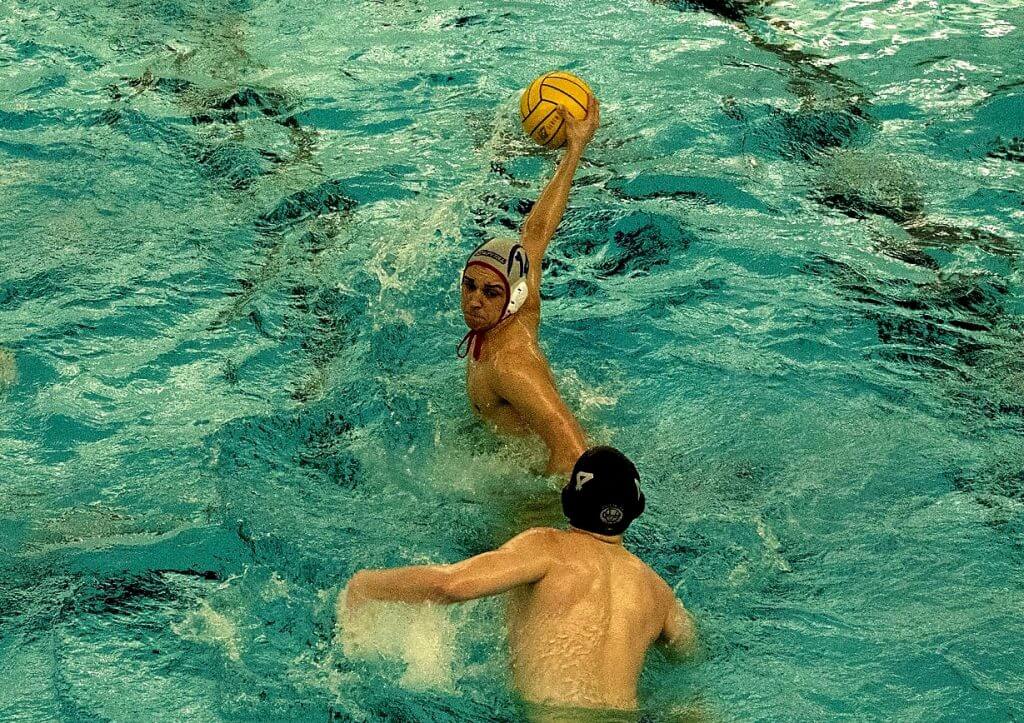
Water polo—a sport relatively unknown in America and one difficult for the uninitiated to comprehend—inspires tremendous loyalty among those who play it.
Count Leonardo Ruzzante, a teenager eager to pursue his passion wherever it leads, as one who has caught the polo “bug.” That includes relocating from his native Italy to Washington, D.C. where he now resides with a host family, taking his junior year at Langley High School in McLean, Virginia.
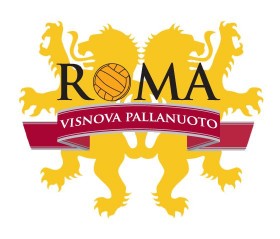 A compact 5-10, with ball skills and a grasp of the game that many players his age can’t match, Ruzzante began playing polo as child in Rome. He then found his way to the Roma Vis Nova club. Run by Alessandro Calcaterra, a former Olympian, as well as former Italian League players Daniele Ruffelli and Luciano Russo, it’s one of the professional clubs competing in Italy’s Serie A2, among Europe’s best polo leagues.
A compact 5-10, with ball skills and a grasp of the game that many players his age can’t match, Ruzzante began playing polo as child in Rome. He then found his way to the Roma Vis Nova club. Run by Alessandro Calcaterra, a former Olympian, as well as former Italian League players Daniele Ruffelli and Luciano Russo, it’s one of the professional clubs competing in Italy’s Serie A2, among Europe’s best polo leagues.
Given his country’s elevated level of competition, Ruzzante realized a future in polo would be more likely outside of Italy. Not only are the players better than their U.S. counterparts—last summer the Italian men captured gold at the FINA World Water Polo Championships, while the Americans finished ninth—Ruzzante hopes to study medicine. Playing polo while attending university in Italy generally does not mix.
[Del Lungo and Dolce Propel Italian Men to 2019 FINA Worlds Water Polo Title]
Last year, he took a bold step and—with his parents’ consent—elected for a year abroad in the USA. Originally touching down in Greensboro, North Carolina, Ruzzante quickly realized that the Tar Heel State was not a hotbed of polo activity. A chance encounter with Marco Favro, a player with Capital Water Polo out of the nation’s capital, led him to move in with Favro’s family. A bonus: much higher-level polo play with the Washington, D.C. club, which is coached by Miras Jelic, a former Serbian professional player who has become one the East’s most highly regarded age group coaches.
Ruzzante recently spoke with Swimming World about his experience in the United States, the challenges of academics versus water polo, an opportunity to play NCAA varsity ball and why—given the coronavirus threat in Italy—it’s probably best for him in America at the moment.
– You’re not a typical American teenager.
I’m an exchange student from Italy. Rome. I live 500 meters from the Colosseum. My father Alessandro is an Air Traffic Controller who works for ENAV S.p.A. My mother, she’s a biologist. I have younger two siblings—one sister and one brother.
– You’re here but your family is in Italy.
Here in the U.S. I feel much better, because in Italy the spread of the coronavirus is uncontrollable, and the government is trying to limit it. In Rome—from what I heard—there aren’t severe cases, more or less two. I’m not worried, and from what I heard from scientists and researchers that with the new season we will be able to manage it.
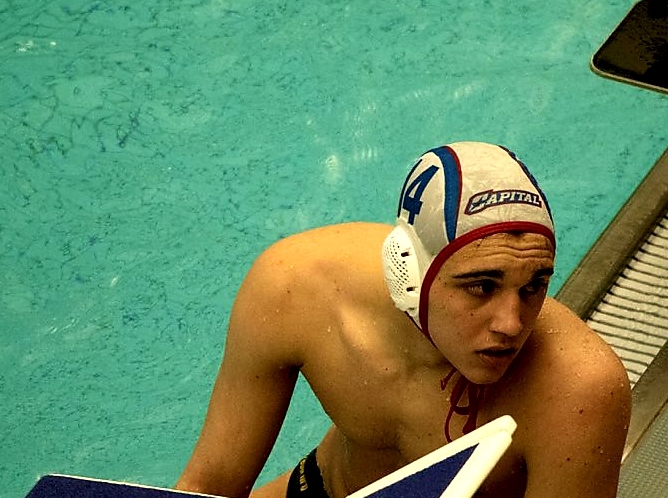
Photo Courtesy: L. Ruzzante
In Italy there are more cases because we checked more people that anywhere else, thousands and thousands of people. Here in the US just some hundreds of people have been checked, because the test and the medical care for coronavirus here is crazy expensive.
[Serie A, All Sport in Italy Halted Due to Coronavirus Outbreak]
I read in The New York Times that a 38 year old man in Miami spent almost $4,000 [and is] not covered by the insurance. In Italy both test and medical care are free or affordable for everyone, under $100 [U.S.].
Looking at the data (3,000 cases in Italy instead in USA some dozens) we get confused.
– Your parents saw the value of being an exchange student. What was the thinking about water polo?.
I wasn’t before in DC, I went to Greensboro, North Carolina. [But] I met Marco in Annapolis for a tournament at Navy Academy. And Coach Miras told Marco that there was another Italian playing for another team, North Carolina. At the end of the tournament [Marco] went and asked me, “Hey, ciao. Parla italiano?”
I thought: “Who the heck is talking Italian with me?”
We shared our contacts and talked once a week. I told Marco I needed to switch families. And Marco asked if I wanted to come with him and do this exchange program with him, with his family.
It was really hard to enter in Fairfax County in Virginia. I had to pass a lot of tests with English and my grades—I had to explain. I’m the first exchange student in five years.
– What about Marco and your relationship with his family?
My family and Marco’s family are similar. I have two younger siblings and Marco has too, one sister and one brother, same ages. And I am the same age of Marco. Our parents have the same age, so it’s like a mirror. It’s my family in another life.
And there also what happened for Marco’s family. It’s another example of the beauty of this country. Marco’s dad is 100% Italian. He was born Italy, studied in Italy, got a degree as an engineer. He met Marco’s mom, [an American]. They met in Italy working for my father’s company.
They were building some antennas because he’s a sound engineer. So they were building antennas, they were working together to build these antennas for my father’s company.
– How does the school experience in America compare to Italy?
It’s completely different. We stay in the same classroom for all five years of high school [and] the teacher tells us which of the classes [to take], and we cannot choose our subjects. There are just core subjects—no electives. They are 11 instead of seven, we have the whole year, the same subjects for five years. Sometimes they switch from chemistry to biology or we add some hours of physics during the third year of high school for the last three years.
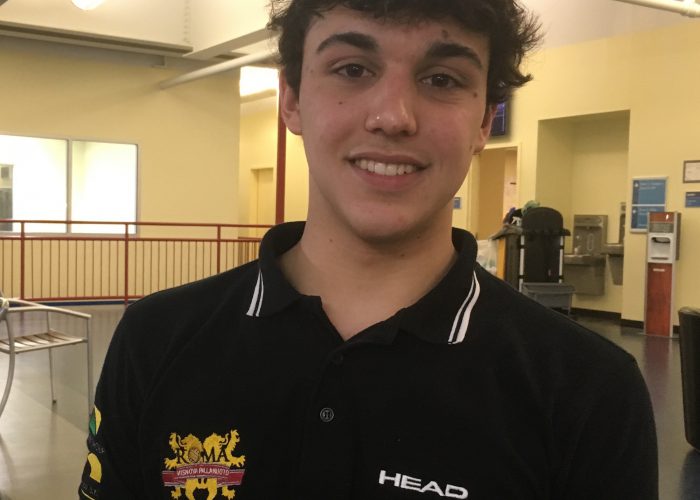
Leonardo Ruzzante. Photo Courtesy: M. Randazzo
At the end of high school we have an exam, a huge exam. And the seniors, they don’t finish school earlier like here, but we finish school one or two months later because we have to take these written exams. It’s a week of exams of about the last three years of high school. And we are validated about the last three years.
There is also an oral exam of about one hour and we have to talk about the last three years or the subjects. We can be tested on all the subjects—11 subjects of the last three years.
– Is that how you get into university in Italy?
No, that’s just for the diploma. Three months later we have to take a national exam [for] entry to university and it depends by the subject. [If] I want to be an engineer, I have to take the national exam for engineering. That’s for the public schools because in Italy there are just public schools. And most of the times the public schools are the best in Italy.
We don’t have a ranking of the best schools in Italy, but we have the ranking of the best schools in the biggest cities. My school is the best in Rome and one of the first five schools in Italy.
– What plans do you have for your education?
I’d like to be a doctor. This was my dream since I was young.
– Now that you’ve been exposed to the American educational system which do you prefer?
I have a preference for the American [system] because in Italy, [if] I want to be a doctor, I cannot choose the subjects that will lead me to take the exam for medical school. Instead, I have to study Latin, Greek… I’m not [being asked] to know subjects to enter in medical school.
Here I’m taking AP Physics II, genetics, sports medicine. That will lead me to medical school better than studying language or other subjects.
– But clearly one of the best places to play water polo in the world right now is Italy.
As I study for the best school in Italy, I also play for one of the best club in Italy. In the last three years I won a national championship in Italy. I won two bronze as an international championship. It’s like the country championship.
– You have a path to success in Italy academically and you have a clear path to success in terms of water polo. What would you do if you ended up going to university in Italy?
That’s what I hate [about] Italy. The sport and school, they cannot live together. You cannot do sport at a high level and [go to] a good school. You have to decide school or sport. And that’s why I asked to do this exchange program. Here I can do water polo at high level, I am learning here.
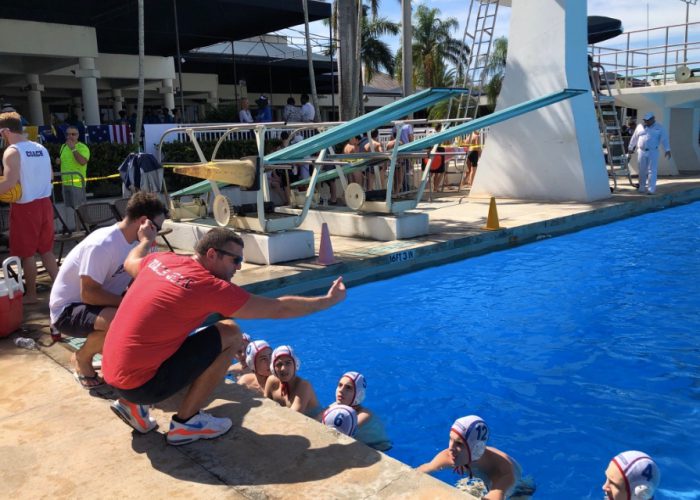
Coach Jelic with his team in Florida. Photo Courtesy: Capital Water Polo
I’m taking the highest classes in my high school. I’m 17 [and] I’m taking classes in which there are seniors older than me. And I can do a both.
In Italy, it’s not possible. Last year, for example. I had the two medals around my neck, highest grades, nine out of 10. My school asked me, stop water polo.
– You’ve gone from the Nova club in Italy to Capital Water Polo in D.C. It’s not the same level of play.
I can tell you, here water polo is growing because there are a lot of programs. I’ve never seen in Italy, a lot of tournaments like here. Here I played every weekend, two, three, four games.
In Italy it’s not like this. In Italy, we have a championship… We start the championship in February and we finish in August. And we can do common trainings with other teams, but it’s really rare. We don’t have the opportunity to play like here.
[On The Record with Miras Jelic of Washington DC’s Capital Water Polo]
Here, you can play a lot. And playing is one of the most important things to grow in water polo. Because in Italy, water polo is ball and swimming. But ball is before swimming. Here it’s water and after polo.
– Now that you’re playing with Capital, will you participate in Junior Olympics?
I cannot. I have to go back to Italy and get a diploma.
I want both. I am going to take the GED. And also the SAT.
I have one more year in Italy and one more year here. If I spend a year in Italy, doesn’t really matter here because it’s like the senior year here.
– If you come back to America to for school, do you look at a Johns Hopkins, a Washington & Jefferson or a Pomona-Pitzer—all strong academic school that play polo?
I’m really interested in John Hopkins. I would love to play and study for them. I’m a strong student. And a great worker, too. I’ve always worked in my life and obtained the results just working. It’s the only way to obtain results.
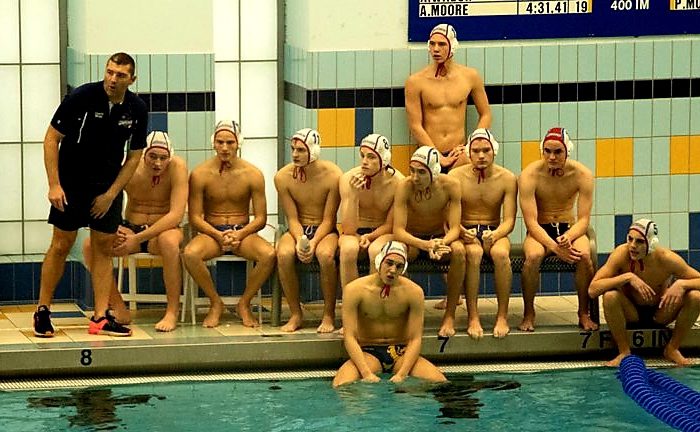
Capital Water Polo. Photo Courtesy: L. Ruzzante
I really want to come here because in Italy, also if you work, sometimes you’ve not paid back for the work that you’ve done. There’s still a… it’s called “Baronato.” It’s an Italian word. Barone is the Duke.
That means there’s a society, an old society, that holds power. We can’t say no. So they tried to put all the familiars, all the friends in a way that they will get a job, a nice job and this avoid the others to get this kind of jobs.
Or not just the job, what’s in a university? If there’s a seat for someone, they will give the seat to one of the [professors’] children.
It’s a cycle that it’s been working for years and years. They’re trying to break it.
– Is it the same as in water polo as well?
No. In water polo, no. In water polo there’s no way.
In soccer [it’s] different. We’re talking about money. So anytime when you’re talking about money, there’s this Baranato. But in water polo you cannot [make] a lot of money. You have to play for Pro Recco; players there make a lot of money. [Filip] Filipovic, Ratko Rudic, play for Pro Recco. You can play for Brescia.
[Swimming World Presents “Lessons with the Legends: Water Polo Coach Ratko Rudic”]
Still, we say, one out of thousand people can do that, can live [on] water polo.
– So you don’t see that as a future for you?
If I’m going to study in Italy for university, I probably will give up water polo, because it’s impossible to balance [both].
– That’s not what you want.
No, no, no, no. Absolutely, no.
– So you want to return here for college. Do your parents agree?
My mother is worried. She wants me [to go to] university in Italy.
My father led me to this decision. But that’s also because in Italy, the percentage of the young people that leave, they go to the USA, because it’s a lot of better.



